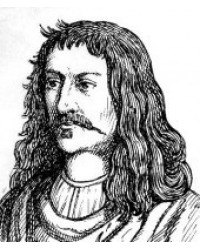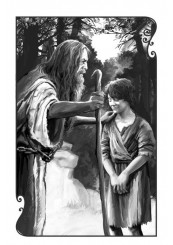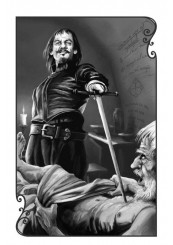Hans Jakob Christoffel von Grimmelshausen

Hans Jakob Christoffel von Grimmelshausen (1621/22–1676) was a German author. He is best known for his 1669 picaresque novel Simplicius Simplicissimus (German: Der abentheurliche Simplicissimus) and the accompanying Simplician Scriptures series.
Grimmelshausen was born at Gelnhausen. At the age of ten he was kidnapped by Hessian soldiery, and in their midst experienced military life in the Thirty Years' War. At the close of the war, Grimmelshausen entered the service of Franz Egon von Fürstenberg, bishop of Strasbourg. In 1665, he was made magistrate (German: Schultheiss) at Renchen in Baden. On obtaining this appointment, he devoted himself to literary pursuits.
Grimmelshausen's work is greatly influenced by previous utopian and travel literature, and the Simplicissimus series attained a readership larger than any other seventeenth-century novel. Formerly, he was credited with Der fliegende Wandersmann nach dem Mond, a translation from Jean Baudoin's L'Homme dans la Lune, itself a translation of Francis Godwin's The Man in the Moone, but recent scholars have denied this; he did, however, write an appendix to a 1667 edition of that translation, the basis for that association. Der fliegende Wandersman was included in his collected works, though without the appendix.
In 1668, Grimmelshausen published Der abentheurliche Simplicissimus, which has been called the greatest German novel of the 17th century. For this work, he took as his model the picaresque romances of Spain, already to some extent known in Germany. Simplicissimus has been interpreted as its author's autobiography; he begins with the childhood of his hero, and describes the latter's adventures amid the stirring scenes of the Thirty Years' War. The rustic detail with which these pictures are presented makes the book a valuable document of its time. For some, however, the later parts of the book overindulge in allegory and finally become a Robinson Crusoe story.
The historian Robert Ergang draws upon Gustav Könnecke's Quellen und Forschungen zur Lebensgeschichte Grimmelshausens to assert that "the events related in the novel Simplicissimus could hardly have been autobiographical since [Grimmelshausen] lived a peaceful existence in quiet towns and villages on the fringe of the Black Forest and that the material he incorporated in his work was not taken from actual experience, but was either borrowed from the past, collected from hearsay, or created by a vivid imagination.
€12.27 (24.00 лв.) €15.34 (30.00 лв.) Ex Tax: €11.26 (22.02 лв.)





